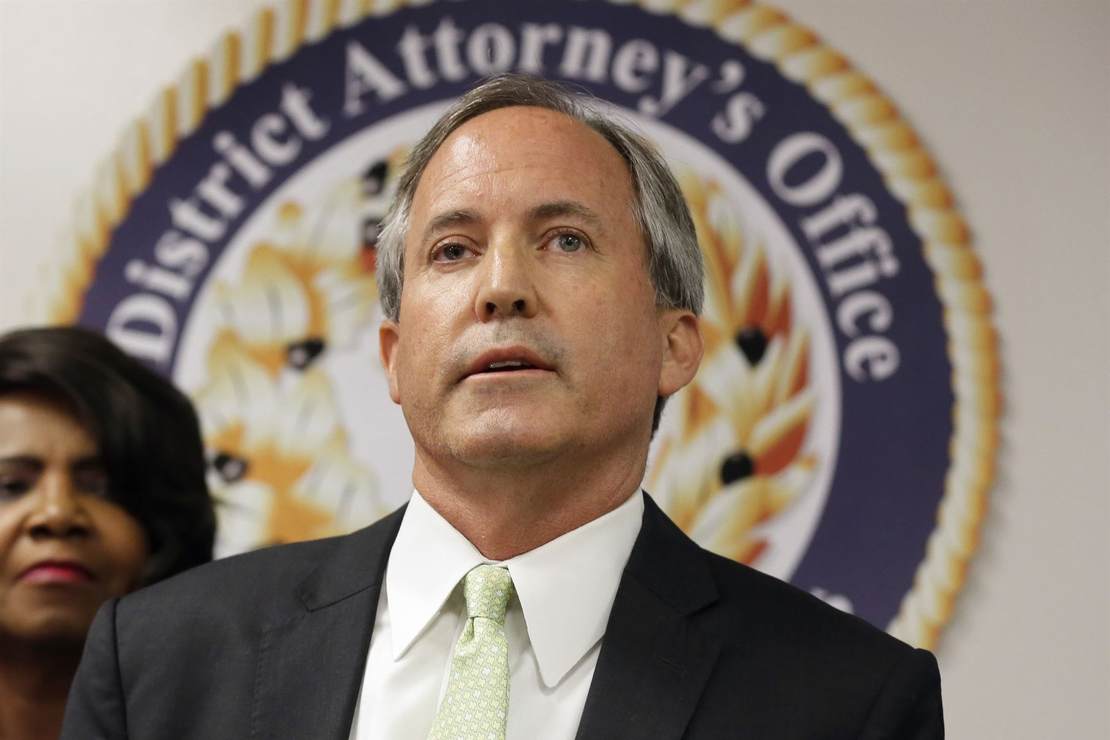Late Monday night, Texas Attorney General Ken Paxton (R) filed a motion urging the U.S. Supreme Court to block key swing states from certifying “unlawful election results” in the presidential election, instead urging the Court to remand the election results to state legislatures for review. The lawsuit urges the Supreme Court to direct state legislatures to reverse the unlawful actions of election officials by choosing Electoral College electors themselves.
Paxton’s brief on behalf of Texas contests the results in Georgia, Michigan, Pennsylvania, and Wisconsin.
“As set forth in the accompanying brief and complaint, the 2020 election suffered from significant and unconstitutional irregularities in the Defendant States,” Paxton argues in the brief, first reported by Breitbart. The Texas brief lists three kinds of violations of federal law:
Non-legislative actors’ purported amendments to States’ duly enacted election laws, in violation of the Electors Clause’s vesting State legislatures with plenary authority regarding the appointment of presidential electors.
Intrastate differences in the treatment of voters, with more favorable allotted to voters – whether lawful or unlawful – in areas administered by local government under Democrat control and with populations with higher ratios of Democrat voters than other areas of Defendant States.
The appearance of voting irregularities in the Defendant States that would be consistent with the unconstitutional relaxation of ballot-integrity protections in those States’ election laws.
These three broad claims echo many of the Trump campaign’s lawsuits challenging the presidential election results in those states.
The Electors Clause in the U.S. Constitution states that only state legislatures may direct how states choose electors in the Electoral College. Election officials allegedly violated that clause by altering election procedures in violation of state law (enacted by the legislatures), ostensibly in order to help people vote during the Wuhan coronavirus pandemic.
Jenna Ellis: Swing-State Legislatures Will Reject ‘False Corrupt Results,’ Switch Electors to Trump
State elections officials also treated some voters more favorably in more Democratic-leaning areas of states, helped in that effort by the Center for Tech and Civic Life (CTCL), an organization that directed funds to election officials in such areas.
Finally, while many election officials relaxed voting standards in order to help voters worried about COVID-19, those relaxed standards made potential fraud more likely.
“All these flaws – even the violations of state election law – violate one or more of the federal requirements for elections (i.e., equal protection, due process, and the Electors Clause) and thus arise under federal law,” Paxton’s brief argues, citing Bush v. Gore (2000).
In other words, these serious violations of federal law make state election matters an issue for the Supreme Court. The Texas brief argues that “a ruling on the 2020 election would preserve the Constitution and help prevent irregularities in future elections.”
Texas “respectfully submits that the foregoing types of electoral irregularities exceed the hanging-chad saga of the 2000 election in their degree of departure from both state and federal law.”
Importantly, Paxton claims that “these flaws cumulatively preclude knowing who legitimately won the 2020 election and threaten to cloud all future elections.”
The Texas brief claims that election flaws “affect an outcome-determinative numbers of popular votes in a group of States that cast outcome-determinative numbers of electoral votes.”
“This Court should grant leave to file the complaint and, ultimately, enjoin the use of unlawful election results without review and ratification by the Defendant States’ legislatures and remand to the Defendant States’ respective legislatures to appoint Presidential Electors in a manner consistent with the Electors Clause,” the Texas brief urges.
Such a Supreme Court order would fall in line with the legislative strategy President Donald Trump’s attorneys Jenna Ellis and former New York Mayor Rudy Giuliani have supported.
On Monday, Ellis outlined the strategy, predicting that state legislatures in Arizona, Georgia, Pennsylvania, and Michigan will independently investigate the election results and flip the electors from Joe Biden to Trump.
Republicans hold an edge over Democrats in each of the states mentioned. Ellis mentioned Arizona (11 electoral votes), where Republicans control the House (31 seats to 29 seats) and the Senate (17 seats to 13 seats). Both Ellis and Paxton noted Georgia (16 electoral votes), where Republicans control the House (103 seats to 75 seats) and the Senate (35 seats to 21 seats); Pennsylvania (20 electoral votes), where Republicans control the House (113 seats to 90 seats) and the Senate (28 seats to 21 seats); and Michigan (16 electoral votes), where Republicans control the House (58 seats to 52 seats) and the Senate (22 seats to 16 seats). Paxton mentioned Wisconsin (10 electoral votes), where Republicans control the State Assembly (63 seats to 35 seats) and the Senate (19 seats to 14 seats).
If the legislatures in states Jenna Ellis named flip for Trump, that would represent 63 electoral votes, flipping the election from 306 electoral votes for Biden and 232 for Trump to 295 electoral votes for Trump and 243 for Biden. If the legislatures in states Paxton named flip for Trump, that would represent 62 electoral votes, flipping the election from 306 electoral votes for Biden and 232 for Trump to 294 electoral votes for Trump and 244 for Biden.
Ellis rightly praised the Texas brief, citing a key quote. “Our Country stands at an important crossroads. Either the Constitution matters and it must be followed, even when some officials consider it inconvenient or out of date, or it is simply a piece of parchment on display… We ask the Court to choose the former.”
While this strategy might be fraught with danger should the state legislatures take it up on their own, a Supreme Court order would lend important legitimacy to the effort. Furthermore, both Ellis’ strategy and the Paxton brief involve directing the state legislatures to investigate the results before acting, and their investigations would provide the opportunity to convince the American people that this does indeed restore legitimacy to the election.
Even without a Supreme Court order, this Texas brief lays out a powerful case for state legislatures to take action. It will be a high bar to convince the American people that this drastic step is the right one, but Americans are indeed concerned about the legitimacy of the 2020 presidential election, and rushing forward without this kind of legislative review will likely weaken Americans’ faith in the electoral process.
It is important to get this right, and fast.
TX v State Motion 2020-12-0… by Breitbart News
Editor’s Note: Want to support PJ Media so we can continue telling the truth about the 2020 election? Join PJ Media VIP TODAY and use the promo code LAWANDORDER to get 25% off your VIP membership.
Tyler O’Neil is the author of Making Hate Pay: The Corruption of the Southern Poverty Law Center. Follow him on Twitter at @Tyler2ONeil.






